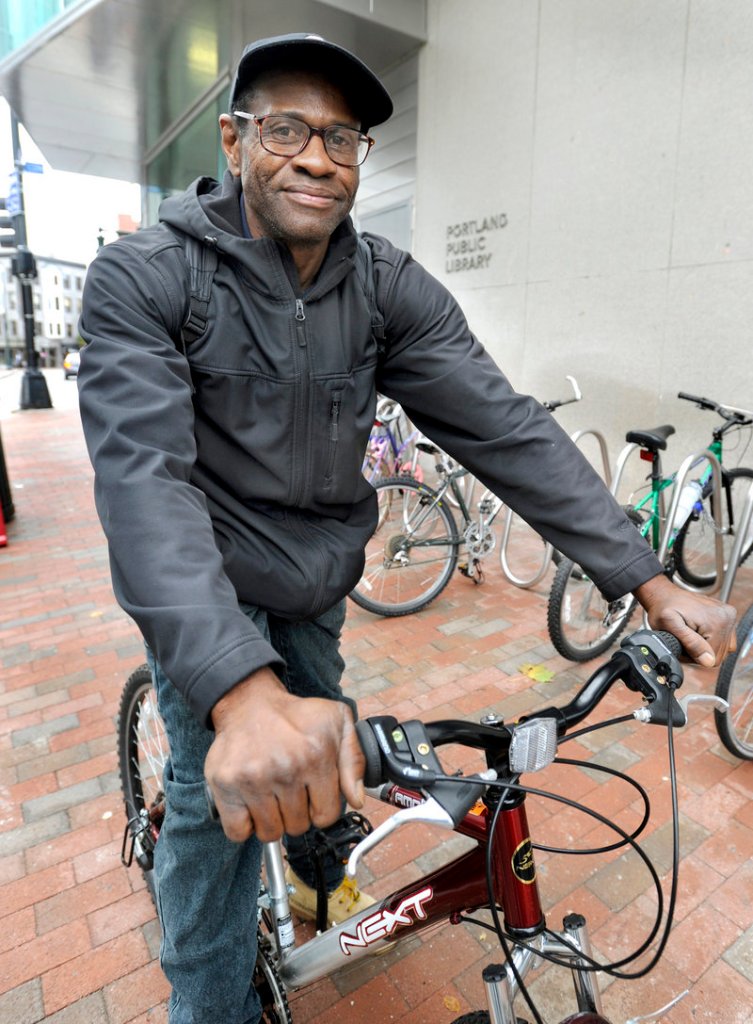All summer long, Dan Wright would join the line of men filing into Portland’s Oxford Street Shelter to claim a floor mat for the night.
But Wright didn’t sleep long. A staff member would wake him at 2 a.m. He’d head out into the dark, unlock his bicycle and pedal five miles to Westbrook, where he reports to work at 4 a.m. to drive a delivery truck.
“I’m no different than anyone else out here,” he said. “When you fall, you’ve got to get back up. But you have to apply yourself.”
Wright is one of many skilled and experienced workers who have fallen into Maine’s social safety net in the past two years. He is confident he’ll climb out soon, and took a big step when he moved into a temporary apartment this month.
But Wright knows it takes hard work and a little help. Often, that help includes education or child care. In Wright’s case, it was a $93 bicycle from Walmart.
In March, after work dried up in Florida, the 54-year-old Wright took a one-way driving job to Maine, where there seemed to be more opportunities.
He lived in Old Orchard Beach for a few months and paid rent with a driving job in that area. After work there ran out in July, he came to Portland to get whatever work he could.
Wright could have asked the city for General Assistance to rent an apartment, but said he wanted to line up a job before taking on expenses such as rent. So he moved into the shelter.
He lined up many mornings for day labor jobs, such as moving furniture for $35 a day. He saved enough money to get to Augusta to get a Maine truck driver’s license and to get a cell phone so he could leave a phone number on job applications. “It takes money to make money,” he said.
Wright kept most of his clothes in a locker at Preble Street Resource Center, and carried a backpack with a change of clothes, a book, road maps and razor. “That’s like my office.”
The state provides a debit card with $200 worth of federal food supplements each month. The supplements are tricky because they don’t buy hot food, not even hot coffee, and Wright had no home or kitchen for cooking. He would buy one piece of fruit or bottle of juice at a time and carried sliced meat and bread in his backpack.
Wright’s determination, and his Class A license, landed him a job driving a delivery truck for about $11 an hour. But the job started in Westbrook at 4 a.m.
Aaron Geyer of Portland’s Health and Human Services Department used some grant money and bought the bike for Wright so he could pedal to work before the buses start running.
“He’s really motivated and didn’t want to really spend any time on welfare,” Geyer said.
The city is helping Wright get an apartment through an intensive rehousing program that provides a security deposit and other support. He’s still waiting for a permanent opening, but moved into a weekly apartment that’s closer to his job.
Wright is confident he won’t need welfare assistance much longer. “I can make it on $11 an hour,” he said.
He is most looking forward to not sleeping on the floor, he said. But first he’ll have to save up to buy a bed for his new apartment.
“It’ll work out,” he said, pointing up with his finger. “He brought me this far.”
Staff Writer John Richardson can be contacted at 791-6324 or at:
jrichardson@pressherald.com
Send questions/comments to the editors.


